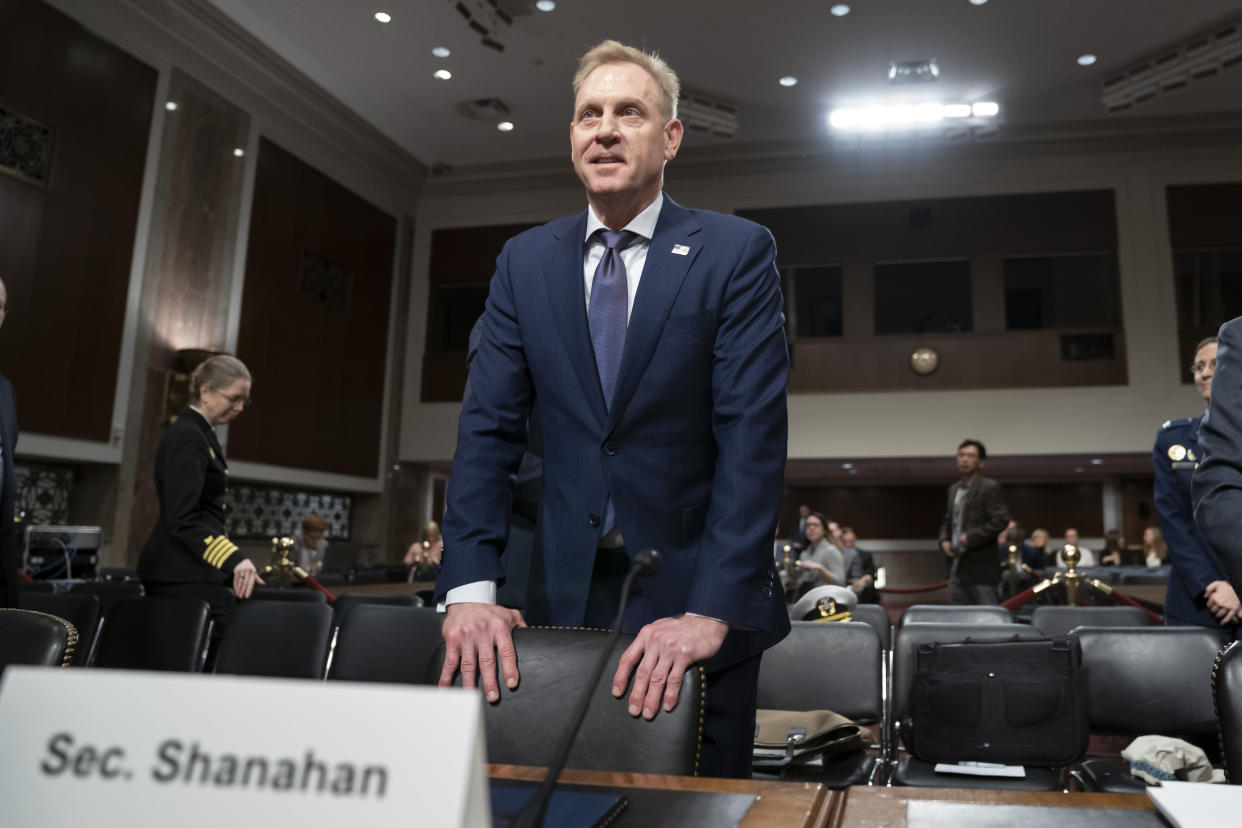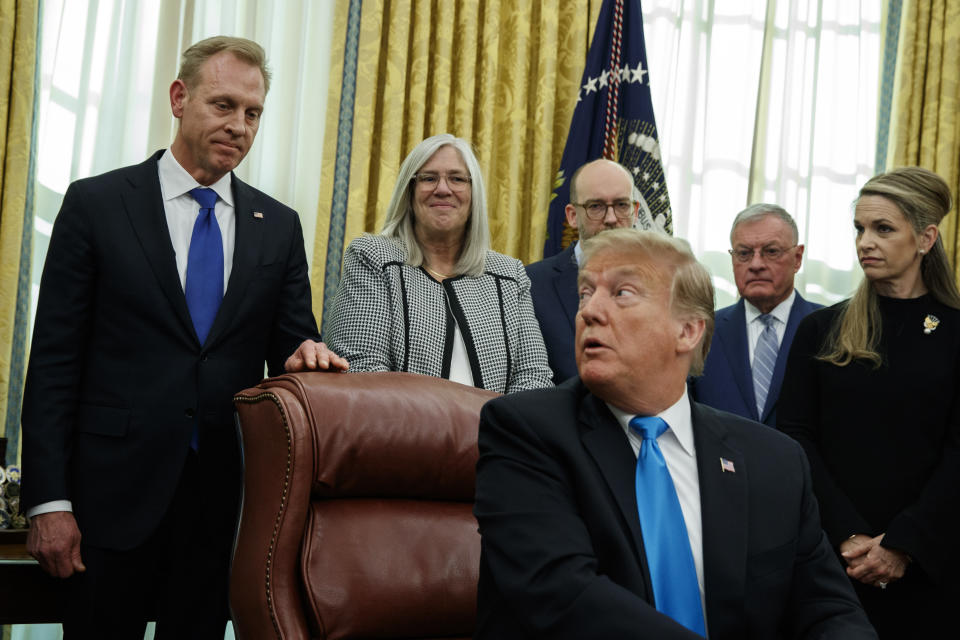Trump's likely pick for Pentagon job makes 'trains run on time.' Can he do much more?

President Trump’s visit to the Pentagon Friday morning fueled speculation he was on the verge of nominating acting Defense Secretary Patrick Shanahan to the top position, but that didn’t happen, and a Pentagon official later said the purpose was a top secret briefing “about Afghanistan and other national security issues.”
Trump’s visit appears to have left Shanahan, who many believe is the likely pick for the top job, hanging. But the bigger question, however, is whether Shanahan, a former Boeing executive, is up to the job.
Shanahan was confirmed as deputy secretary of defense in July 2017 and became acting defense secretary at the start of the year, following the resignation of Secretary James Mattis. He has received mixed reviews so far, with some sources crediting him for his focus on efficiency, but others criticizing his management style and for being overly deferential to Trump.
“He’s a very good nuts and bolts guy,” said a former senior Pentagon official, who added that despite having no previous Defense Department experience, Shanahan during his time in government has quickly mastered “how you get things done in the Pentagon, how you exercise power over the budget.”
The former Boeing executive is “a guy that understands large organizations and how to make them function properly and get the most out of them,” said retired Army Lt. Gen. Guy Swan, a vice president at the Association of the U.S. Army.
Swan described Shanahan as a man who could “make the trains run on time,” a phrase repeated verbatim by another person who spoke to Yahoo News.
Some observers credit Shanahan’s business experience as an asset in the Pentagon. “He’s brought some really important insight to the department, particularly as we’ve grappled with the idea of accelerating innovation in response to new and emerging threats,” said a former senior military officer. “He brings a different point of view, a different culture to the department, and that can be disruptive, but it can also be very positive.”

Although Shanahan’s industry experience was in aerospace, his support for Army modernization efforts has given him a strong base of support among the service’s leaders, according to Swan. “From the Army’s perspective, having him in that position [of defense secretary] is viewed as a very positive development,” Swan said.
In particular, Shanahan has supported Army Chief of Staff Gen. Mark Milley’s modernization priorities and the establishment of the Army Futures Command, the service’s first new four-star command since 1973, Swan said.
With Trump’s announced intention to nominate Milley to succeed Marine Gen. Joseph Dunford as the next chairman of the Joint Chiefs of Staff, that relationship will be crucial if the president nominates Shanahan to the defense secretary job permanently, Swan added.
When Trump ruffled Air Force feathers with his plan to create a Space Force, against the wishes of most in the Pentagon, it was left to Shanahan to make it happen. This led to friction with Air Force Secretary Heather Wilson, who announced her resignation on March 8. But a former senior Pentagon official said Shanahan’s handling of the Space Force issue exemplified one of his strengths: his ability to translate Trump’s diktats into “palatable” policy directives.
“He’s been great at taking crazy stuff the president says and somehow translating it into something halfway reasonable,” the former senior Pentagon official said. After Trump declared his intent to create a Space Force, over congressional and Air Force opposition, Shanahan “took charge of that” and steered the policy. The plan is now to place the Space Force inside the Air Force, much as the Marine Corps falls under the Department of the Navy, the former senior Pentagon official said. “He was able to maneuver through that bureaucratic mess and sort of make the president happy without upending the entire Pentagon.”
But this ability, if anything, makes it less likely that Shanahan will stand up to Trump, according to the former senior Pentagon official. “In positions like this, you have to be willing to respectfully speak truth to power,” but in the Trump administration, “everybody who has respectfully spoken truth to power eventually gets canned,” the former senior official said, adding that Shanahan will have watched and learned not to rock the boat. “His biggest benefit to the president is he’s a loyal soldier,” the former official said. “He will be a yes man for the president.”

However, the former senior Pentagon official had no worries about Shanahan’s lack of previous defense experience, noting that “on highly operational issues” the defense secretary would typically defer to the Joint Chiefs chairman. A bigger challenge for Shanahan will be the role that a U.S. defense secretary is expected to play on the world stage, at “NATO summits and things like this,” according to the former senior Pentagon official. “This is where he really doesn’t have the policy background. This will be a steeper climb.”
It’s also possible that the president may leave him in place in an acting capacity, meaning that Pentagon bureaucrats might slow-roll any Shanahan initiatives they oppose, in an attempt to wait him out.
“They do that a little bit with political appointees anyhow, if they don’t like what’s going on, but they’ll for sure do it with ‘acting’” appointees like Shanahan, said the former senior Pentagon official, “because ‘acting’ has less stature than the real Senate-confirmed permanent person in the job.”
Shanahan, even if he is nominated, will also have to overcome sound doubts on the Hill. Last week, he endured some tense exchanges with members of the Senate Armed Services Committee during a hearing on the 2020 defense budget. Democrat Tim Kaine of Virginia lambasted Shanahan for his department’s obfuscation regarding military construction projects threatened by Trump’s use of Pentagon money to fund a border wall. Shanahan also faced allegations that the Pentagon’s overseas contingency operations fund had become a “slush fund” to pay for things that had nothing to do with U.S. wars.
Shanahan told the committee that later that day he would provide it with a list of the construction projects at risk. This incensed Kaine, who said that the committee staff had been asking for the list since mid-February, and Shanahan’s promise to deliver it later that day meant it would not arrive before the Senate’s early afternoon vote on Trump’s emergency declaration.
“I feel completely sandbagged,” Kaine said. “I don’t think that you giving us that list today after the vote, when we’ve been asking for it for a month, is a good-faith response to the request of this committee.”
Shanahan, who appeared calm throughout the hearing, told Kaine that “there has not been a deliberate attempt to withhold information” and that his team had “worked to be 100 percent transparent with Congress.”
(Cover thumbnail photo: Al Drago/Bloomberg via Getty Images)
_____
Read more from Yahoo News:



